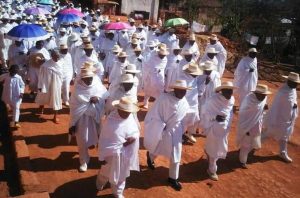The Turkana are a monotheistic people. They believe in one God, known as Akuj, the creator of the universe. “All things belong to Akuj”, they say. They call upon him in times of great need, through prayers and chants and through animal sacrifices. The Turkana believe that Akuj is the source of all power: if he decides to intervene, nothing can stop him.
If a Turkana sees that the person he is talking to is doubtful or sceptical about what he says, he immediately bends over, puts his forefinger in the sand, then brings it to his mouth, wets it with saliva and points it to the sky, saying: “One God! What I am saying is true. If it is not, let Akuj kill me”.
Akuj is one and undivided. He can do both good and evil – he brings rain and drought, death and life, reward and punishment, good luck and bad luck. Nothing happens outside his control. He plays an active part in everything. So, he can be asked to stop or change the course of any event.
Akuj allows the spirits – both good and evil – to operate in the life of human beings, to correct their habits or to punish their evil deeds. If someone does not respect the elders, or is selfish when it comes to food sharing, Akuj will intervene to punish that person.
Ancestors live in the great akai (home) of heaven close to Akuj. If a human group forgets its ancestors, misfortune is what comes upon them: how can they forget the real owners of their flocks? Then, someone in the clan will be given the task of offering a sacrifice.
Like a parent who corrects his or her child, Akuj punishes those who break the law, be they young or old. In most cases, God intervenes directly, without resorting to witchcraft, which is the work of evil people and evil spirits (ngipian).
In the past, God lived very close to people. He would even come down from the sky (called akuj, like God himself) just to enjoy the nice smell of the food women were cooking. One day, a woman, while crushing some seeds in the mortar, hit God in the face with her pestle. Deeply offended, Akuj withdrew very far from the earth. Yet, he is still in contact with people through mediators. Akuj is essentially good. However, people or the spirits can make him angry through their misbehaviour.
A bird spotted in daylight or an animal found in the wrong place are deemed evil spirits. These animal-spirits are dangerous and they make Akuj angry. When, however, people break the law – by robbing a Turkana, resorting to witchcraft or black magic, or disobeying the rules of clan – Akuj allows the spirits to take control of the whole situation. In the worst case, he can even allow them to ‘kill’ the culprit.






